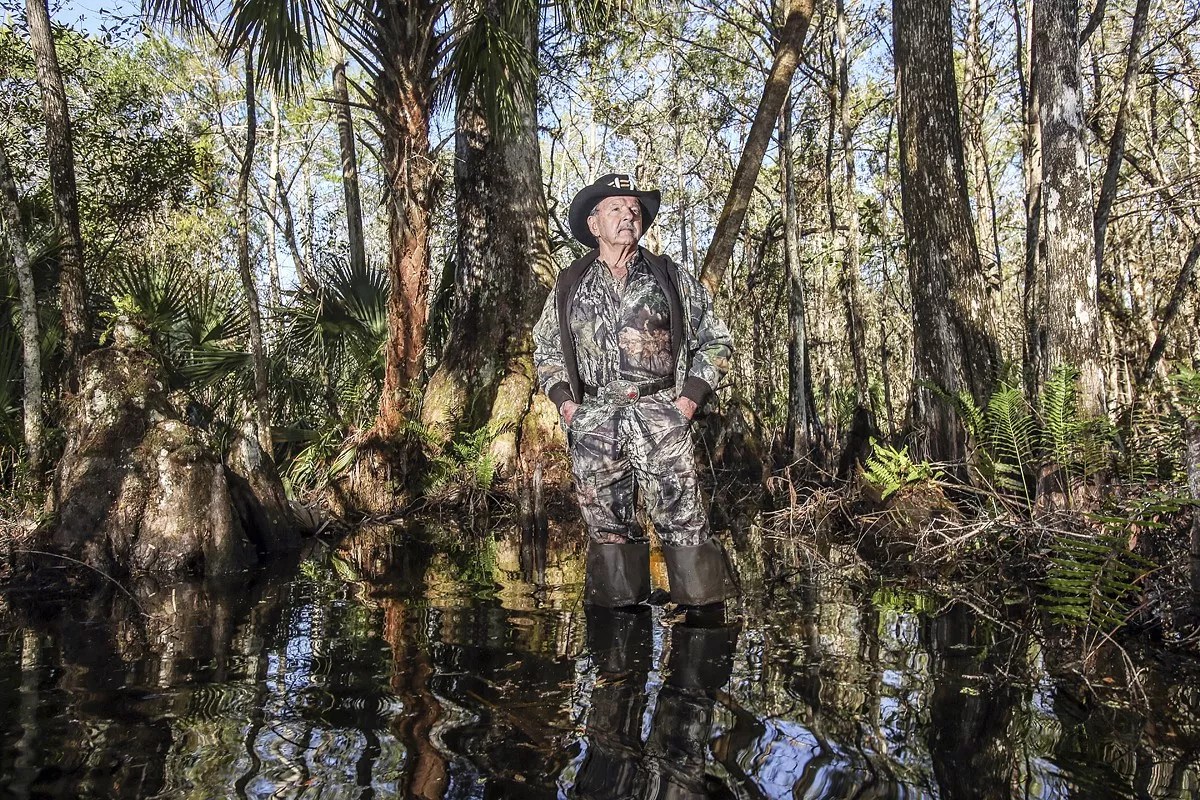
Photo by CandaceWest.com

Audio By Carbonatix
Dressed in head-to-toe camouflage, Ron Bergeron emerges from a yellow thicket and gazes at the open pasture. A heavy rainstorm has left behind a field of black mud and wet grass in Big Cypress National Preserve. The sky is gray and the land bare, save for a herd of deer grazing in the brush a mile away.
The 74-year-old suddenly hears faint rustling in the distance and snaps to attention. He slowly unzips his olive-green windbreaker and sidesteps into the clearing. He raises his left hand as if to quiet the nature around him and listens to the muted purr of a bear.
After living his whole life in the Everglades, Bergeron is well aware that approaching a full-grown American black bear is risky. Twice, he says, he’s seen them break 30 mph running in this very field. “You can’t outrun ’em, so don’t even try,” he tells his guests in a slight Southern drawl.
Bergeron’s face is plump and pink. He has a thick salt-and-pepper mustache, blue eyes, and crow’s-feet. His forehead shines with sweat and his chest heaves with each labored breath. It’s been a long, swampy day, but curiosity drives him forward. He closes in, less than a dozen feet away.
By the look of its belly, the bear is a pregnant female. With her muzzle to the ground, she gently paws at the outer edge of a dirt puddle in search of food. Local wildlife routinely convenes here, where an overhead metal feeder releases a batch of corn kernels twice a day.
Sensing he’s gone too far, Bergeron’s partner, Ali Waldman, shouts, “Don’t, Ronnie! Not so close!” Seated in a black Jeep 30 yards away, she nervously sets down her camera and yells, “You’re too close, Ronnie! She’s smelling you.”
But Bergeron hunches his back, making his stocky, five-foot-nine frame appear smaller, and continues to inch forward. With each step, the wet earth squelches beneath his rubber boots. Suddenly, the bear looks up and Bergeron freezes. Her eyes, round and brown, meet his, and for a few seconds, the two share an unlikely communion.
The Hummer-driving multimillionaire has built a reputation as a fierce defender of the environment.
He soon realizes he can go no farther. He tips his black cowboy hat rimmed with alligator teeth and then backs away toward the Jeep. He lumbers into the driver’s seat and asks Waldman if she took enough photos of the encounter. “I’ve been closer than five feet away from one,” he says. “I probably could’ve had her eating out of my hand.”
Bergeron is a truly unique Florida character. Over the years, the big-talking, gold-plated-Hummer-driving multimillionaire has built a paradoxical reputation as a GOP power player and a fierce defender of the environment in which he’s spent his whole life. As a commissioner for the Florida Fish and Wildlife Conservation Commission (FWC), he’s made headlines bucking conservatives as the biggest opponent of expanded bear hunting.
But “Alligator Ron” is used to being a contradiction. The fifth-generation Floridian considers himself a protector of the natural world, even as he has earned his fortune managing the state’s largest road construction and site-development business. That has sometimes made him a target for environmentalists, who have charged him with hypocrisy for backing natural gas plants, digging rock mines, and illegally wrestling gators – as well as supporting climate science’s biggest opponent, Donald Trump.
But even the greenest activists in Florida acknowledge he has done real work to better the Glades. And now, at 74 and newly alienated from Gov. Rick Scott, Bergeron is thinking of mounting his own run for governor as a self-made, business-friendly champion of the Everglades – exactly the kind of weird combination that might work in a bizarro state like Florida.
“Government is a business, and as a successful businessmen, I believe I could make a big difference for all Floridians,” Bergeron says.
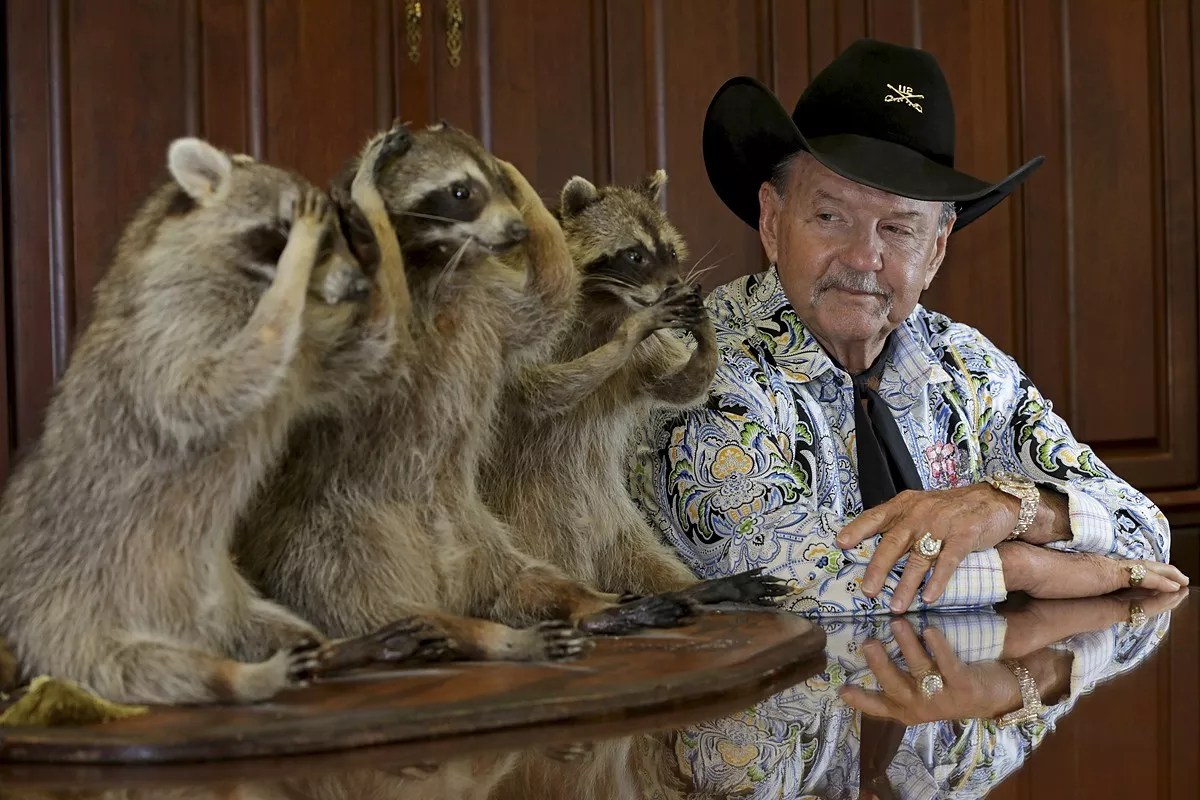
The 74-year-old developer made headlines when he voted against a bear hunt in 2015.
Photo by CandaceWest.com
Stranded 52 miles from civilization, an 18-year-old Bergeron slogged through 18 inches of mud and two feet of murky backwater. Three days earlier, his airboat had broken down with nary a campground or another boater in sight. So he’d spent hours navigating through the swamp, dodging gators and snakes, sleeping on beds of sawgrass. The reeds were sharp, but they kept him somewhat afloat. Occasionally, he awakened to the drone of insects and spent hours swatting them away.
“The mosquitoes were so bad you could reach out and catch handfuls of ’em,” he says. “Most people couldn’t survive it, but it takes more than that to kill me.”
Few Floridians grew up as attuned to life in the River of Grass as Bergeron. Born September 15, 1943, during a family vacation in New Orleans, Bergeron grew up the middle of three in a modest house his parents built out of scrap lumber in Davie. Bergeron is fond of recalling how rats came through the wall until his mom shot them with a .22. At the time, Davie was a farming village on the edge of the Everglades with no more than 500 residents.
“There were no tennis courts, golf courses, or movie theaters,” says Bergeron, who instead spent his time earning Boy Scout badges, roping horses in the rodeo, and exploring the Everglades with his late grandfather, Lonnie Harey, a local game warden. At night, the two hunted for deer and gigged frogs in an environment that still hadn’t been altered to the point of ruin by the meddling Army Corps of Engineers.
“He took me on my first airboat ride when I was 4,” Bergeron says. “I can still remember the way it felt, seeing God’s landscaping, the smell of nature, the wildlife, and the sunsets. I was one of the last generations to see the Everglades before we had flood control, levees, pump stations, and conservation areas.”
“I was one of the last generations to see the Everglades before we had flood control.”
Bergeron’s parents, Percy and Dorothy, owned one of the town’s first grocery stores – a humble outfit with hitching posts outside. Years later, the couple opened their own restaurant, Percy’s Steakhouse, where Bergeron worked as a busboy.
“I was the best [at] tips,” he says, “I could throw a tablecloth 20 feet before you got there and it would land on the table.”
During his years at Stranahan High School, Bergeron tried out for the varsity football team, where he soon made a name for himself as a feverish overachiever. “I barely made it,” he says, laughing. “I was fifth-string, but I had discipline. I made sure that by the first game, I was first-string.”
Dana Wallace, Bergeron’s coach, later told the Sun Sentinel: “I’d tell him to do 200 situps and he’d do 500.” Soon enough, Bergeron was starting as halfback, and by his senior year, the team won the state championship.
But later that year, Bergeron and his mother got into a ferocious argument. “She said she’s the boss under this roof, so I left home,” he says. “I had only $235.12 in my pocket.”
For the next few months, he pumped gas at a local service station for 40 cents an hour. He lived in the back and took baths in the sink.
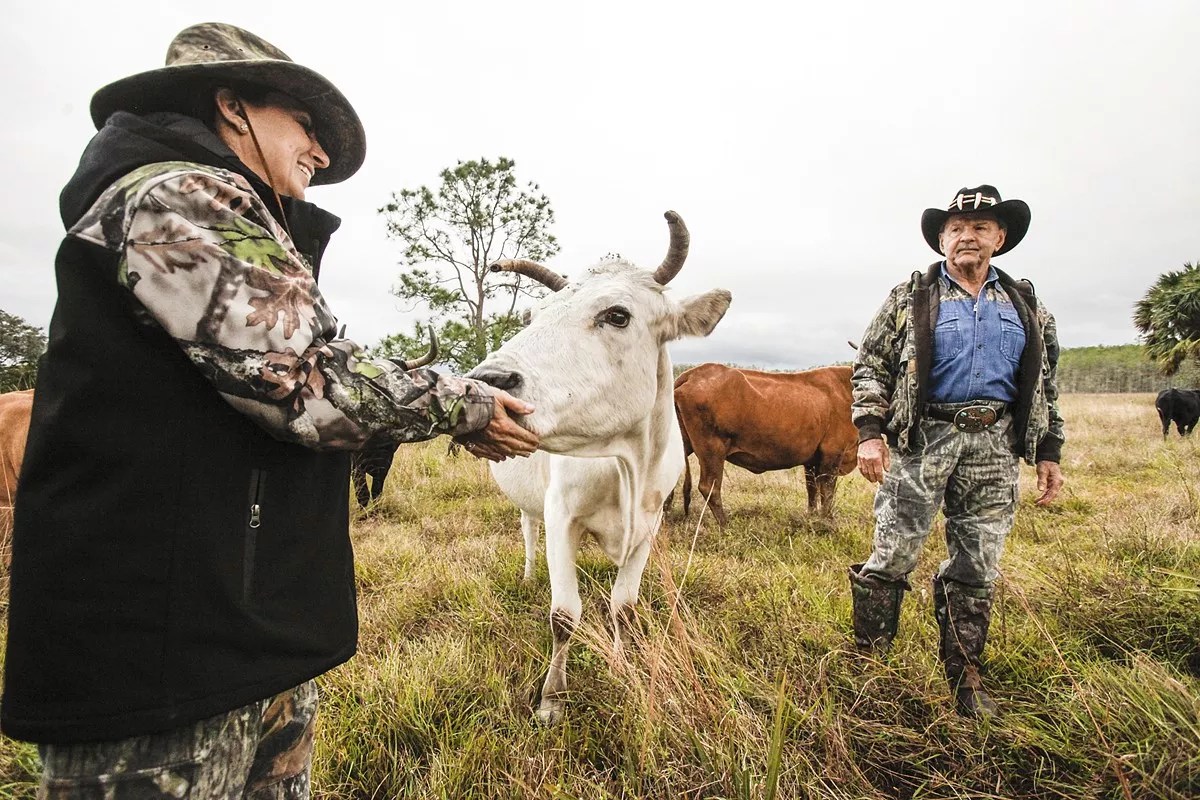
Fifth-generation Floridian Ron Bergeron has spent a lifetime advocating for Everglades restoration.
Photos by CandaceWest.com
Later that year, Bergeron found a job with Hully Stirling, his old scoutmaster, clearing the fields of a coconut plantation in exchange for room and board. Before long, neighbors began noticing Bergeron’s work and asked if he’d mow their pastures and tend their orange groves. He borrowed Stirling’s old Ford Ferguson tractor and for two years worked 18-hour days until he raised enough cash to launch his first company, Bergeron Land Development, in 1965.
Over the next seven years, Bergeron methodically expanded, investing in wetland properties, digging rock quarries, and selling the limestone. By the time he was 25, he was a multimillionaire and had 150 people working for him. In his free time, he competed at Davie’s rodeo grounds, which his family had helped to found in the ’40s, and often won competitions there.
Even as his firm grew, though, Bergeron realized his small-time operation was little match against South Florida’s corporate behemoths. His big break came in 1972, when he overheard that developer Mort Kalin was laying the infrastructure for Pembroke Lakes, a massive new suburb, and needed to prep 2,100 acres of land. Bergeron rushed to Kalin’s office to offer his services.
“It was just a cold call,” Kalin later told Executive South Florida Magazine. “This young fella walks in, a farm-type kid who wanted work. I asked what type of equipment he had. He said a five-yard dump truck and a backhoe back on the farm.”
Bergeron recalls, “[Kalin] said to me: ‘I don’t wanna disappoint you, but I’m building a city, not a driveway.'” Bergeron turned to leave, but Kalin, a horse-loving former calvary officer in World War II, noticed Bergeron’s silver championship rodeo belt buckle and called him back. For hours, the two talked horses and cowboy culture, until Kalin handed Bergeron the job.
Bergeron eventually rented draglines and bulldozers to move seven million tons of earth. “Bergeron wasn’t the average farm boy,” Kalin said. “He was aggressive and knowledgeable.”
Harnessing his famous workaholic fervor, Bergeron grew his business over the next decade into one of the most successful in the state. He expanded into agriculture, emergency services, self-storage, and even garbage collection, handling 37 percent of Broward County’s trash.
In 1988, he married Cindy Lou Brumbaugh, with whom he would have six children. With at least 35 privately owned firms under his name, he took on massive highway construction contracts such as the I-95 interchanges at State Road 84 and the Sawgrass Expressway. When he won the Fort Lauderdale-Hollywood International Airport road project in the mid-’80s, the $120 million undertaking was valued as the largest ever in Florida.
Even as his business exploded, Bergeron, then in his early 40s, lived in a trailer in Pembroke Pines with his growing family, relying on a generator for electricity. But that austerity didn’t last forever. By 1989, he owned three homes surrounded by wetlands: an 80-acre ranch in Weston, an 8,000-acre ranch that borders Big Cypress National Preserve, and a campground in the Everglades established in 1946. His personal real-estate holdings grew to at least $28.3 million as he became a major local political player, holding fundraisers and showering cash on favored candidates; and a philanthropic power, giving hundreds of thousands of dollars to Davie to help expand its rodeo grounds and to local churches and nonprofits.
The way Bergeron tells it, though, he never changed much from the teen who fought his way out of the swamps when his boat crashed.
“I never forgot the most important lesson,” he says today. “No matter how rich or famous you get, you still gotta put on your pants one leg at a time.”
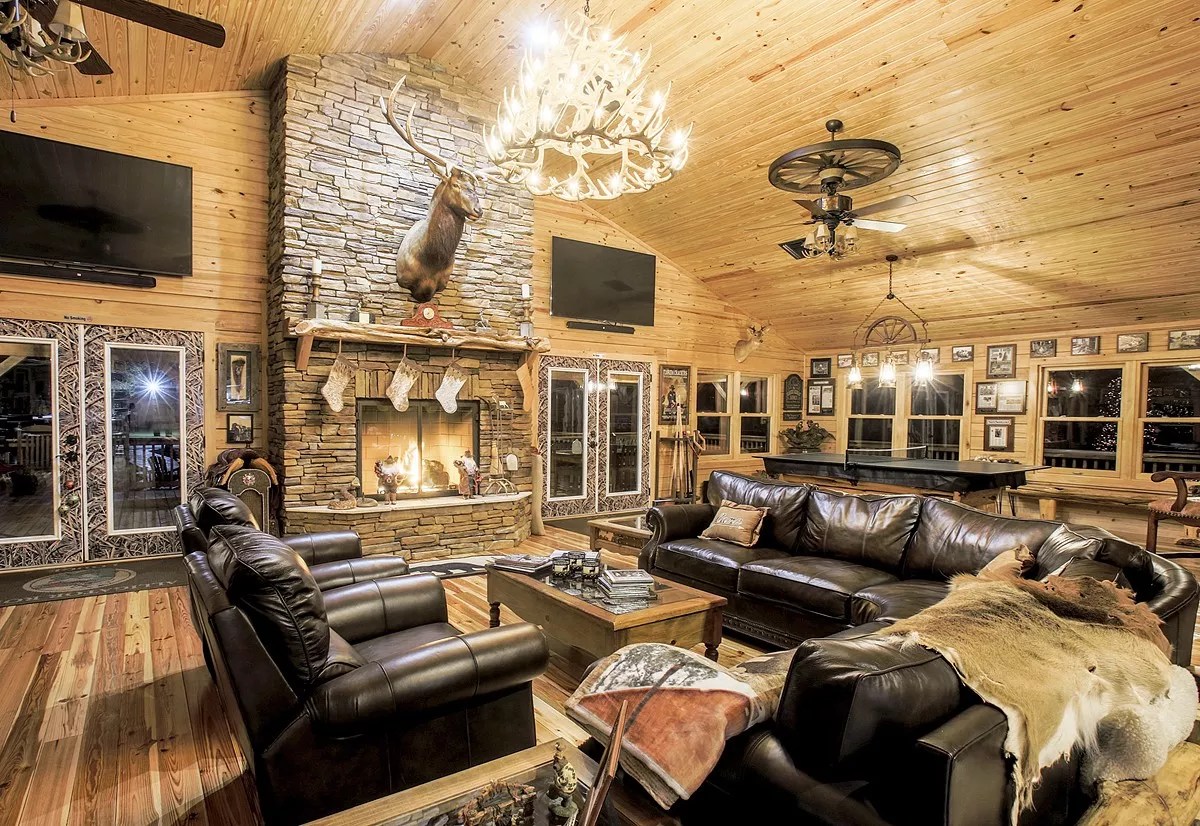
Photo by CandaceWest.com
Around 10 a.m. April 30, 2006, an eight-foot alligator dragged 62-year-old Ron Bergeron 15 feet underwater. He had been giving three guests a tour of his 8,000-acre Green Glades West property off Alligator Alley. As the group neared a pond, Bergeron spotted a lone alligator sunning itself on the shoreline and asked his guests if they’d like to witness “an old cracker tradition.”
Bergeron threw his body onto the gator, and it thrashed wildly in resistance. Its teeth snapped loudly beside Bergeron’s ears. Suddenly, the reptile’s tail wrapped around his leg and the two began to roll toward the pond. Once in the water, the alligator chomped down on Bergeron’s left hand with 2,000 pounds per square inch of pressure and took him in a death spiral to the bottom of the pond.
Bergeron struck the alligator on the nose – once, twice, then three times as he’d been taught as a boy – and quickly swung the creature toward his chest, gripping its torso tightly. Sensing he had won, Bergeron kicked his legs and emerged above water.
“All the guests were clapping. It was like a damn Tarzan movie,” he says, laughing. “I told ’em: ‘I’m bleeding bad. Hurry up if you want to take a picture.'”
Bergeron has never been afraid of bold risks – even if they backfire like the gator tussle, which would lead to a bloody wound, nasty headlines, and threats of state charges. Indeed, as Bergeron’s company grew into one of the biggest developers in South Florida, some critics say risk-taking has sometimes led him to prioritize cash over a commitment to the Everglades.
The gator took him in a death spiral to the bottom of the pond.
In 1988, for example, Bergeron clashed with Broward residents when he asked county officials to change 296 acres of land, east of U.S. 27, near a temporary landfill, from agricultural to industrial use. The proposal was met with heavy opposition from residents who called it a threat to their rural lifestyle, but commissioners eventually approved the plan.
“Bergeron knew it was marshland when he bought [the property],” Audrey Jedan, a nearby resident, told the Miami Herald. “Don’t tell me he has the right to destroy it to make a profit on it… That land is part of our drinking-water aquifer.”
But Bergeron points out he has never crossed the levee that Broward’s pioneers built in the late ’40s to block the flow of water into populated areas.
“Our forefathers said [the land] inside these levees would be protected forever and [the land] outside would be drained for agriculture, development, and welfare of the general public,” he says. “Whether that decision was right or wrong, [it] wasn’t my decision, but I’ve never crossed that line.”
That may be so, but he certainly has used those development lines to his benefit.
“[Bergeron] didn’t start development, but since he owned property, he just took advantage of it like everyone else,” Lori Parrish, a former Broward property appraiser, told the Herald in 1996.
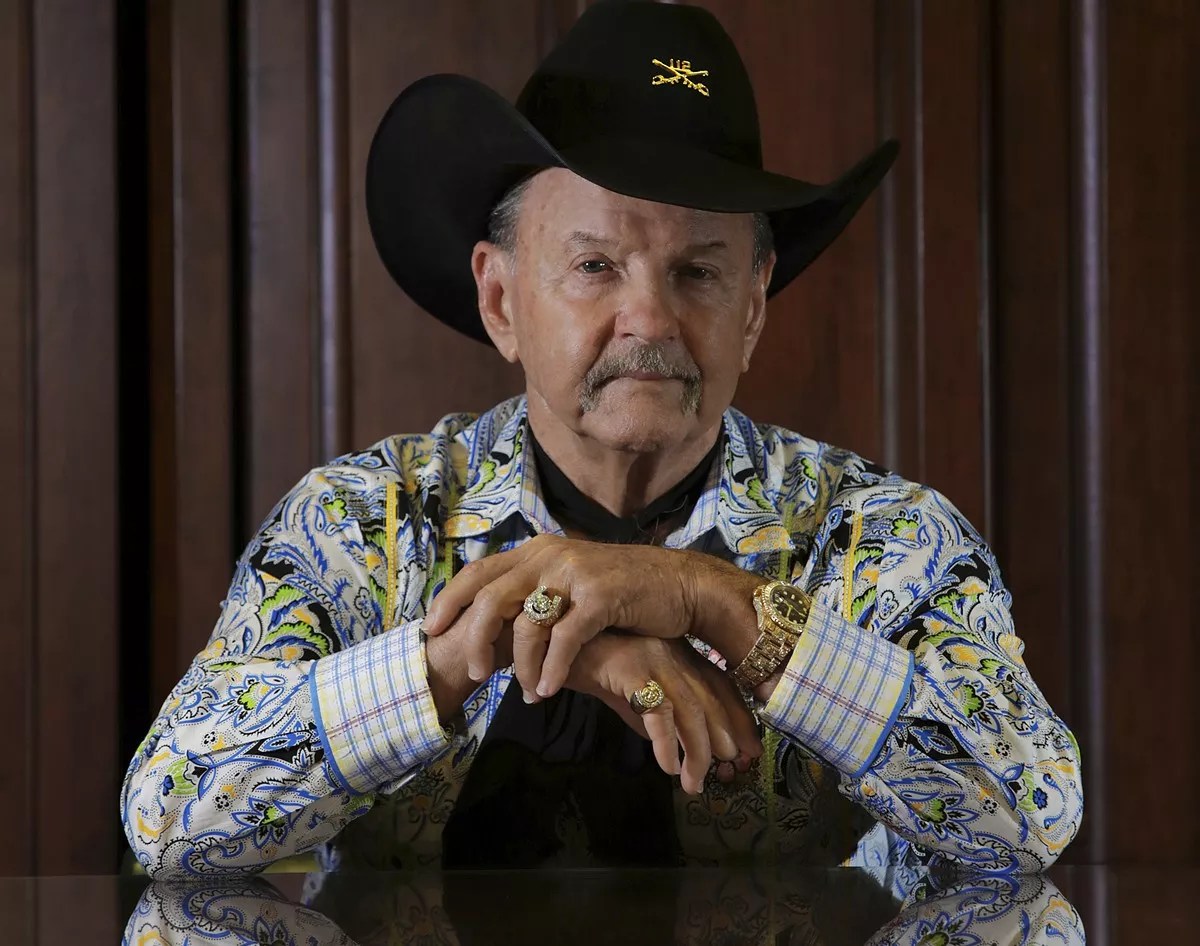
Bergeron, a former FWC commissioner, is considering running for the Republican nomination for Florida governor.
Photo by CandaceWest.com
In October 2000, he came under fire again when homeowners discovered he was planning a natural gas power plant in Pembroke Pines. The plan, he said, would include a building, a cooling tower, and a couple of 80-to-100-foot-tall turbine stacks over 15 acres.
Residents mounted a protest, citing pollution of the environment and potential affects on community health and property values. Bergeron’s aides argued the plant wouldn’t be nearly as dirty as an asphalt plant, a fish-smoking plant, or a wrecking yard, which had all been permitted earlier on the site, but he later abandoned the proposal.
Six years later, Bergeron’s alligator wrestling made headlines. Local wildlife activists slammed him for the stunt.
“We have no objection to Mr. Bergeron playing cowboy,” Heather Veleanu of the Animal Rights Foundation of Florida told the Sun Sentinel, “but physically attacking native Florida wildlife is cruel, and we believe that it is also a crime.”
The FWC agreed, citing a law against molesting or capturing an alligator without a permit. Bergeron was open about wrestling the gator with investigators and soon afterward even confessed to President George W. Bush at the White House that his stitched and bandaged hand was a result of “wrasslin’ an alligator.” Prosecutors later dropped the case. And Bergeron is still indignant about the dustup.
“I wasn’t wrasslin’ a rabbit or squirrel. I was wrasslin’ the top of the food chain,” Bergeron says. “If I was going to molest something, I tell you, it wouldn’t be a gator.”
Bergeron butted heads with locals again in 2011 over a 50-acre parcel of land near Southwest Ranches that he had sold to the Corrections Corporation of America (CCA), a company that owns and manages federal immigration detention centers. U.S. Immigration and Customs Enforcement (ICE) intended to build a centrally located, 1,800-bed facility.
Some locals decried the plan, citing concerns with safety, aesthetics, and property values, while local environmentalists opposed the project on ecological grounds.
“Pembroke Pines was already on the edge of [exceeding] its water allotment from the water district,” says Matthew Schwartz, executive director of the South Florida Wildlands Association. “Prisons use a tremendous amount of water and produce a tremendous amount of waste.”
Though ICE ultimately abandoned the project, Schwartz says he still believes “Bergeron shouldn’t have sold the land to the CCA” in the first place.
Three years later, conservationists targeted Bergeron over the expansion of a limestone mine in southwestern Palm Beach County on a site home to 23 federally protected eastern indigo snakes. “They’re just making an assumption that there’s 23, but nobody’s seen one,” Bergeron said at the time. He then added that 90 percent of the mine’s materials would go toward building public roads, as well as reservoirs and levees in the Everglades.
It’s one of many ways, he claims, that his identity as a developer is compatible with his environmentalism.
“It’s important to define [what] natural resources need to be protected, but you also have to have a vision [on how] to have growth,” he says. Being a developer, he says, gives him the edge to understand sustainability. “In order to understand the Everglades, you need to understand engineering, conveyance, sheet flow, hydrology, and cost-and-benefit [analyses].”
But critics say he’s ignoring a larger truth – namely, that any wide-scale development east of the Everglades affects the fragile environment even if it doesn’t directly encroach into the habitat.
“[Bergeron] says he’s only building in urban areas, but we think these areas are already overdeveloped,” Schwartz says. “Adding more people, more traffic, more waste, more water, and more electricity use is just increasing that footprint.”
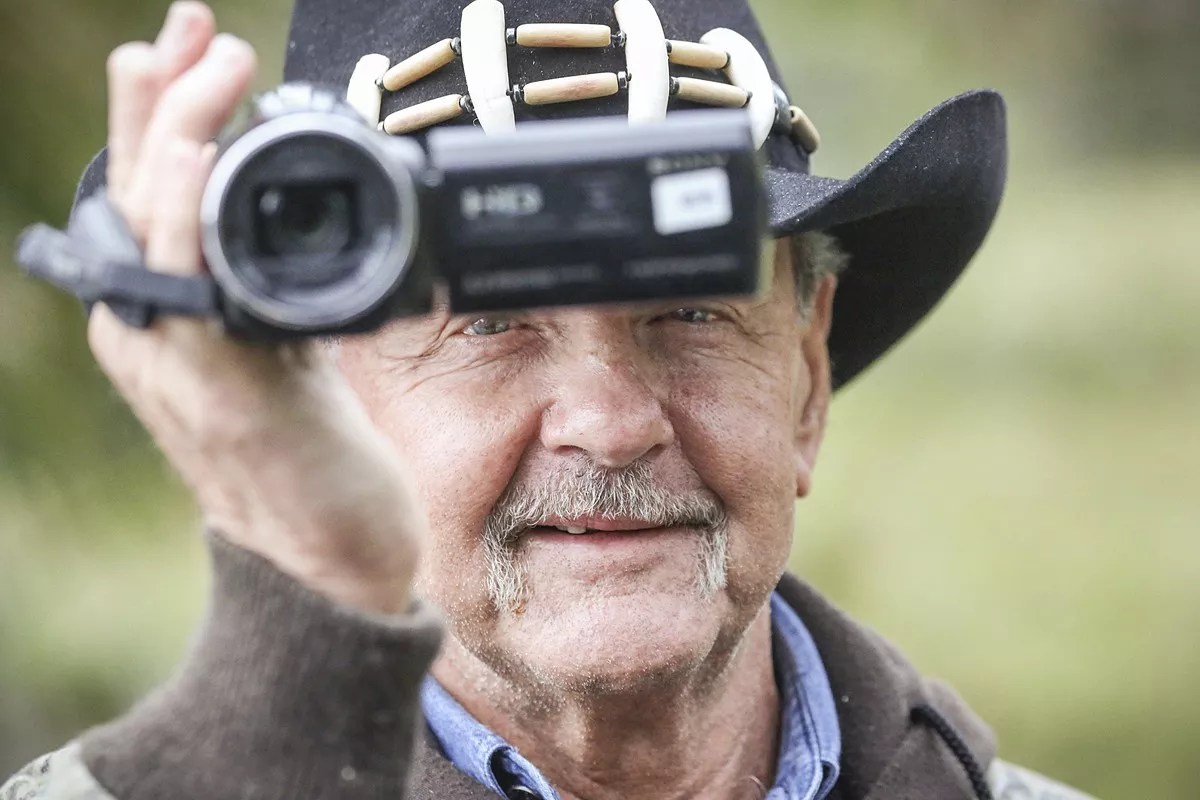
Photo by CandaceWest.com
In the middle of an unmarked path in Green Glades West, two turkey buzzards claw at the ribs of a mangled carcass. Bergeron, curious to see what animal had left the bones, hops out of his Longhorn Ram pickup truck. With each step, small branches felled by Hurricane Irma snap under his rubber boots, startling the scavenging birds. As they fly away, Bergeron kneels in front of the body and traces the inside of its wet skull with his index finger. Slowly, his eyes cloud over and he whispers, “Panther.”
Collecting the scattered fleshy bones, he carefully reassembles the skeleton on the forest floor and notes the creature hasn’t been dead more than a day or two. He picks up the pieces and packs them into the back of his truck. “I’ll have to report that,” he says.
Today, Bergeron is collaborating with scientists to survey panther populations on his nature preserve – another example, he says, of a dedication to conservation that has led to a lengthy stint on the FWC board, which was recently cut short by a rift with Governor Scott.
Bergeron’s leap from backwoods Gladesman to policy-making official began in 2007, when then-Gov. Charlie Crist appointed him to the seven-member FWC board. His years on the commission are a counter-narrative to his contentious development deals and paint the picture of a conservationist willing to spark fights to protect the environment.
At first, Crist faced blowback from the Humane Society for giving the FWC seat to a well-known hunter like Bergeron; others lambasted the governor for appointing a developer who had attended Crist’s $1 million kickoff fundraiser and contributed $9,000. But Crist argued that “just because somebody has business interests does not mean that they don’t care about and have a deep love for natural Florida.”
But Bergeron didn’t have to wait long to show where he stood on Everglades conservation. In 2008, high water shocked the ecosystem, flooding roadside swales and driving white-tailed deer and other smaller animals out of their habitats. “If we don’t start doing something, we’re going to end up with a total massacre,” he told the Herald.
Bergeron, who was expected to support the bear-hunting plan, cast the lone opposing vote.
He spearheaded an interagency emergency plan to divert water from the 700,000-acre conservation area between Tamiami Trail and Alligator Trail south toward Everglades National Park. He then called an emergency meeting between the Miccosukee Tribe and state and federal agencies and helped devise a plan to move the high water into low-level areas. Within a month, the landscape had improved.
“[Bergeron] put his money where his mouth is,” says Eric Eikenberg, CEO of the Everglades Foundation. “As a commissioner, he elevated the need to send water south from Lake Okeechobee to the Everglades to the Florida Keys, and he single-handedly led the effort in getting the government agencies to react and save many species.”
In 2012, Governor Scott reappointed Bergeron for another five years – an appointment that eventually landed him in a fiery fight over bear hunting.
By June 2015, Florida’s black bear population had grown to 3,500, up from a few hundred in the ’70s. Every year, thousands of bear incidents were reported, including close encounters and property damage. Wildlife officials suggested a six-day sport-hunting season to control the population. Bergeron, who was expected to support the plan, shocked hunters when he cast the lone opposing vote.
“We have to do what’s best for the bears,” he said, offering alternative strategies such as bear-proofing garbage cans and installing buffer zones between habitats and urban sites.
Hunters cast the longtime Gladesman as a poseur. “[Bergeron] considers himself a hunter, but he hasn’t been hunting in years,” says Newton Cook, president of the United Waterfowlers Florida, a pro-hunting nonprofit based in Miami. “After that vote, the sports community was real angry at him. I mean, he’s always been a character and a controversial figure, but I don’t think he’s ever done anything that caused as much consternation as that.”
Over Bergeron’s objections, the FWC authorized a weeklong season that October – but his concerns were soon vindicated. Two days in, state wildlife officials announced hunters had already killed a whopping 304 bears, including 36 lactating mothers. The hunt was called off, and the following two years, the commission shot down proposed hunts, voting 4-3 both times, with Bergeron at the head of the opposition.
In September 2015, he took on hunters again when he voted no on an equally contentious panther hunt. Local hunters and ranchers had complained that panthers were eating livestock and potentially threatening family members.
But Bergeron told fellow commissioners: “I’ve been within three yards of panthers. There has never been a panther attack in the history of Florida.”
Cook argues that Bergeron’s heartfelt affection for the Glades clouded his judgment. “He has a place in his heart for certain species, so he doesn’t follow the science,” Cook says. “He’s in love with the panthers and bears, and that’s why there’s no hunt.”
But environmentalists say the developer did important work to protect the threatened species by defying hunters and the GOP majority in Tallahassee.
“His position on hunting has been so important to maintaining a strong and heavy panther population that will hopefully recover from its endangered status,” says John Adornato, regional director of the National Parks Conservation Association. “He’s been a champion of Everglades restoration.”
Bergeron paid a price for that activism, though. He says he asked to be reappointed to the FWC for a third term, but last December, Scott surprisingly chose professional golfer Gary Nicklaus instead. Scott won’t say why he made the change, but Bergeron believes his votes protecting panthers and bears alienated the hard-right governor.
“I guess I pissed off some of his supporters,” Bergeron says. “He could’ve reappointed me, but he didn’t, even though I’m the one who’s got the knowledge.”
Bergeron’s FWC career is over. But even before Scott’s decision, he had already been stewing on plans for a much bigger leap into state politics. The way Bergeron saw it, he had succeeded as a developer, a commissioner, and a philanthropist – why couldn’t he do the same as a statewide political candidate?
“Leadership is a skill,” he says. “There’s an art in bringing people together, listening to people, and building an economy from the bottom up. [Scott has] done that, and that’s what I would do.”
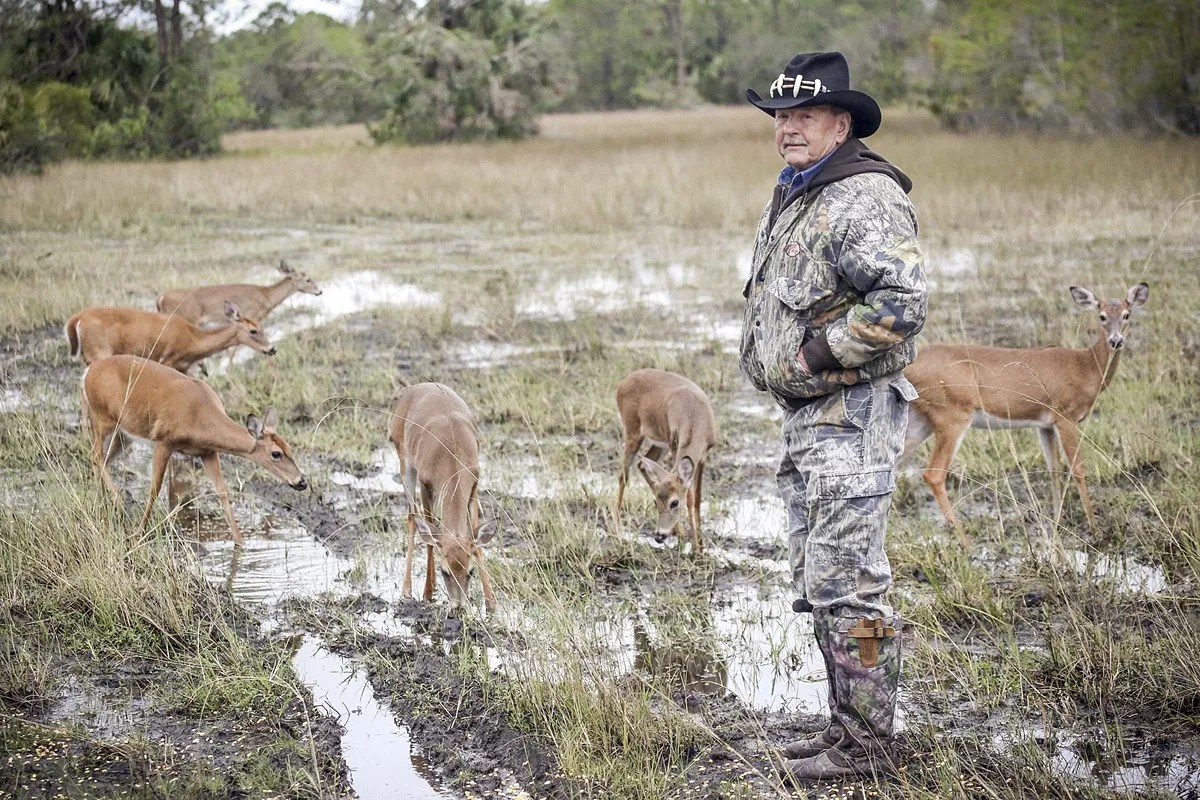
Photo by CandaceWest.com
A chandelier of tangled deer antlers casts an orange glow across the main lodge inside Bergeron’s Green Glades West resort in Big Cypress National Preserve. The light flickers off the fur of the taxidermy displays, bringing to life a stuffed wild hog, a black bear, a bobcat, and an otter, propped above the bar.
Bergeron, still clad in full camo, points at the framed photographs lining the walls. Each shows him standing shoulder-to-shoulder with a celebrity or politician. The names roll off his tongue – Sen. Marco Rubio, President George W. Bush, Secretary of the Interior Ken Salazar – but then he pauses at one picture and smiles.
“I’ve been invited to Mar-a-Lago twice to meet Donald Trump, and I’ve even had a private meeting with him about Everglades restoration,” he says, pointing to the shot of him grinning next to 45. “Next time, I’ll have to invite him to come to my home.”
Just like Trump, Bergeron insists he’s seriously considering turning his über-wealthy maverick-conservative status into a real run for higher office. He’ll announce his candidacy for the governorship by late April, he says – but only if he can get his family onboard.
“I’ve got alligator skin myself, but I have to think about how running for public office might impact my family,” he says.
Even for the legendary risk-taker, a Republican primary would be a difficult trail to navigate. Florida CFO Adam Putnam and Congressman Ron DeSantis are well ahead of the pack in fundraising and name recognition. Putnam has reportedly raised more than $22.5 million, while DeSantis, who has already nabbed President Trump’s endorsement, has about $3.3 million.
But some pollsters say Bergeron shouldn’t be counted out.
“He has all the elements of an outsider and kind of that cowboy image and rough-and-tumble,” Jim Kane, director of the Florida Voter Poll, told the Sun Sentinel. “He’d certainly be a different candidate for governor than anybody else, and that would make him stand out in a crowd.”
Others are skeptical. “It’s hard for me to think that a 70-year-old, even a wealthy one, with a cowboy image and no experience running for office would stand a chance against the likes of Adam Putnam,” says Dave Denslow, a political science professor at the University of Florida. “But I’ve no particular reason to know and was way wrong about Trump.”
“He’d certainly be a different candidate for governor than anybody else.”
Bergeron certainly has money to spend. The developer still runs his family company with his sons Ron Jr. and Lonnie. (He divorced their mother, Cindy Lou, in 2004 and has since been dating Waldman, a prominent local lobbyist.) The developer says he could easily match the $75 million Scott blew through during his first gubernatorial campaign in 2010.
There’s also the question of whether the increasingly right-leaning GOP base would go for Bergeron in a primary. He has donated to Democrats such as Rep. Debbie Wasserman Schultz and Sen. Bill Nelson. He also gave to then-independent Crist in the 2010 U.S. Senate race against Marco Rubio and once again in 2016, when Crist ran for Congress as a Democrat. In total, Bergeron donated at least $105,000 to various candidates since 1993, most recently to Rep. Carlos Curbelo.
But Bergeron says he wouldn’t be a radical candidate; he’d run on deregulation and smaller government and the power of small businesses to create jobs. But he also says Florida needs to spend more on colleges, which have seen their funding slashed by Republican state houses. “A good economy is built from the bottom up, which is why I’m not into big government,” he says.
And Bergeron also isn’t shying away from his longtime love of the environment. However his record pans out, he says he believes Florida sinks or swims on nature.
“We have some of the most beautiful natural resources of anywhere in the world. Tourists come to visit our beaches, our coastlines, our national parks and national preserve, and the Everglades,” he says. “We have to have the vision to look into the future and protect [them].”
As he talks about his politics and his plans, Bergeron stands under the dim light of his lodge and runs his fingers over the glass cover of a display case. He’s missing the tip of one, the result of a rodeo accident a few years ago. Behind the glass sit dozens of silver rodeo buckles, illuminated and polished to perfection. He points to one lovingly and explains they’re the proud winnings of a true Florida cowboy.
As he walks away, he lets out a chuckle. “Even if I run and win,” he says of the gubernatorial race, “they’re just going to have to put a hitchin’ post at the governor’s mansion for my horse.”